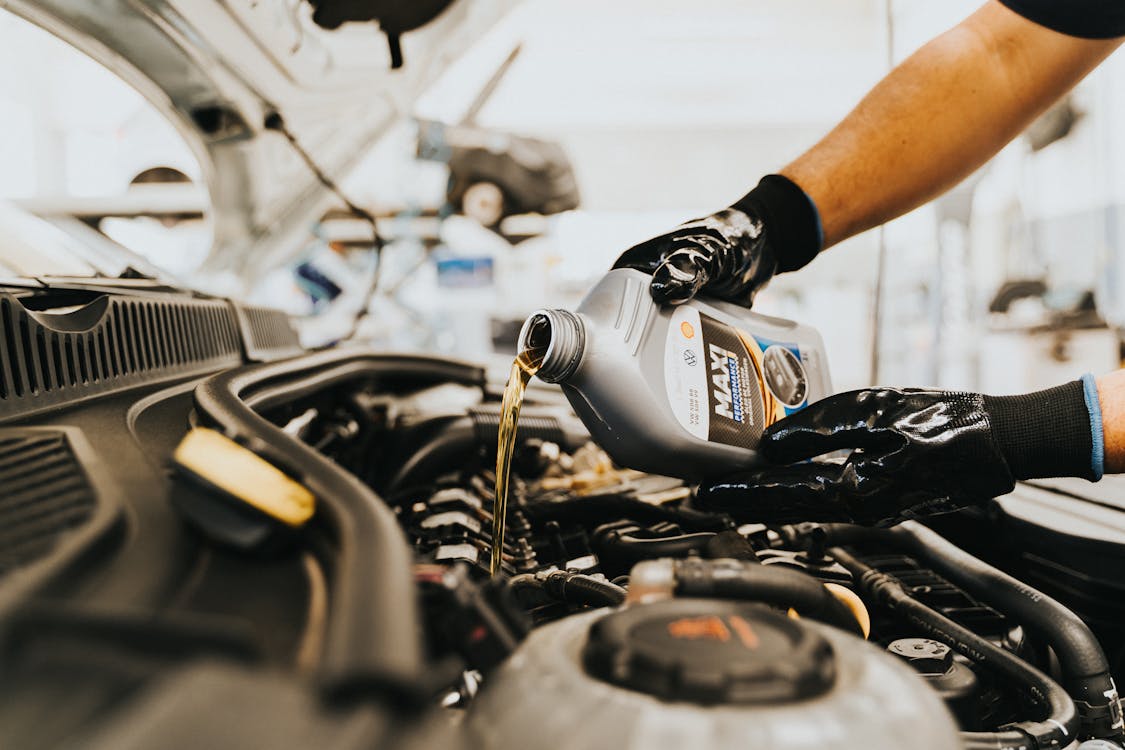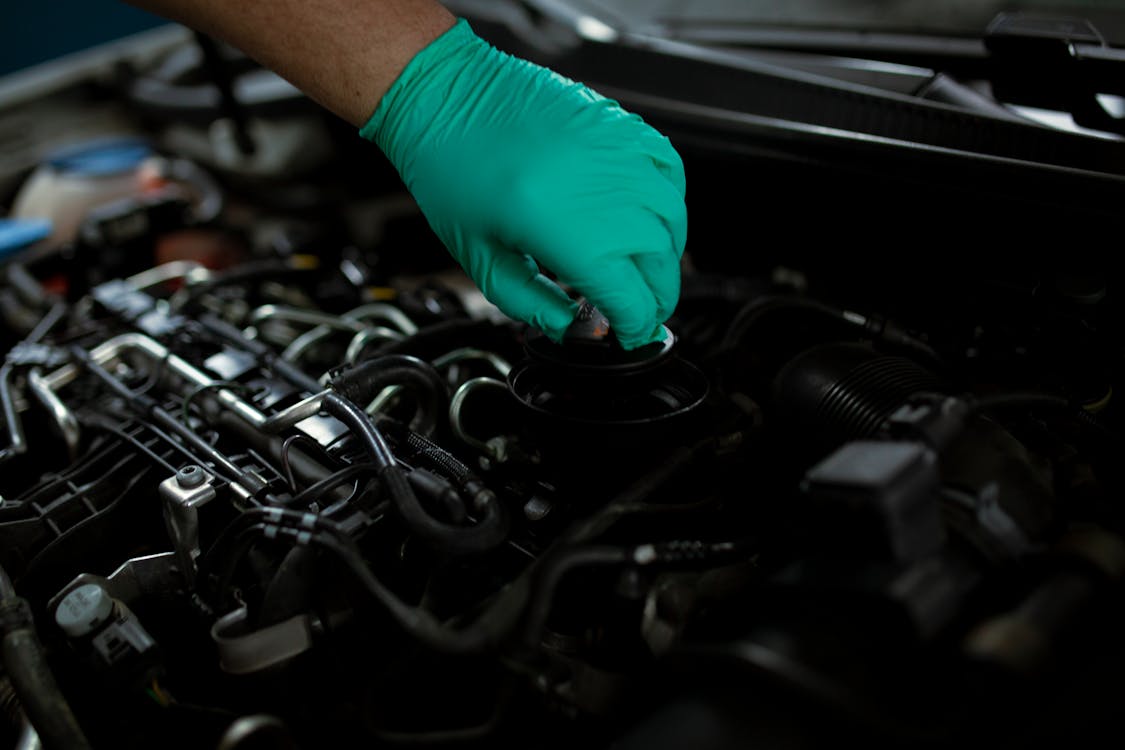The notion that you need to change your oil every 3000 miles is pretty outdated unless you have a 30yr old car. Gone are the days when you need to count the days down to the next time you whip out your dipstick!
Considering that most people drive around 1000 miles per month, it is fair to say you can have your oil changed during your yearly servicing. That is an oil change every 12,000 miles on average. That is a generalization and there can be many reasons why you need a more frequent change but if you are looking for a quick answer, then there is it: have your car serviced every year and have the oil changed when you do. If you would like a more in-depth view, then here are the nitty-gritty details but first ...
Why Do You Need An Oil Change?

A regular oil change is a basic of car care. The car’s oil is there to aid the smooth running of the engine parts by keeping them lubricated and oil degrades with age.
Even though modern vehicles experience reduced friction in the engine thanks to ‘low tension’ piston rings, the right oil is still required for optimum performance.
If you ignore that flickering oil change light or you don’t have a regular oil change, there is a real risk of engine damage and potentially a substantial repair.
Some of the warning signs of old oil are:
- Loud engine noises - particularly when first starting the car
- Smoky exhaust fumes
- Shaking or rattling while the engine is idling
- Inconsistent drive quality including difficulty in maintaining a stable speed.
If you rely on your vehicle, the last thing you need is to find yourself calling for a towing truck and an unscheduled trip to the service center simply because your engine is trying to run on dirty oil.
What Does Your Owner’s Manual Say is the Oil Change Interval?
If your manual gives recommendations on how often you should change your oil, then take those under considered advisement. After all, the manufacturers do test their cars pretty vigorously, so should have a fair idea of what your car needs.
Most economy cars ask that you change your oil every 7000 to 8000 miles, though automakers themselves admit that once per year is very fair. They perhaps assume that, with suitable downtime, most people drive around 10,000 per year and rarely under severe circumstances. Car engines that require full synthetic motor oils or mixed oils may make it as far as 15,000 miles. Plus, there are several other factors to consider (most of which are covered in this article).
Does a Better Oil Need Less Changing?

This is a tricky one. First, you should know there are different types of oils and you should choose your oil according to the type of engine, age of the vehicle, driving habits, and regular driving conditions.
The four types are:
- Conventional oil - available in a range of quality levels and viscosity grades, suitable to simple engine designs and regular driving
- Synthetic oil - thanks to chemical engineering, synthetic oil molecules have better properties than conventional oil molecules because of the uniformity of shape and fewer impurities. they are better able to cope with extremes of temperature and generally contain high-performing additives.
- Synthetic blends - a mix of conventional base oil and synthetic oil that gives greater resistance to oxidation than conventional oil alone and they also have excellent low-temperature properties.
- High mileage oil - with unique formulation and additives, this oil is designed to prevent oil leaks and reduce oil burn-off in older engines. It is for late model cars and newer cars with +75,000 miles on the clock.
On the surface, yes, the data says that more expensive oil doesn't need changing as often, but the stats are weird and mixed. For example, the best oils are often used on high-end (very expensive) cars, and in those cases, the high-end cars are built so they don't need oil changes as often. On the other hand, few people are putting premium oils in their rust bucket cars, and there is no guarantee the oils would last very long if they did.
Some synthetic mixed oils don't break down in the same way as traditional oil. They are more expensive and do last longer. Does that mean you should put premium synthetic oils in your rust bucket car? Probably not. If a car needs good oil for correct lubrication, then feed it the good stuff. Otherwise, don't pay a fortune for premium high-value high-performance oils on a car that doesn't need them. The amount you save on less frequent oil changes is pulled down by the price of the oil.
Does the Type of Vehicle Matter When it Comes to Oil Changes?
Is a Nissan SUV more oil hungry than a Nissan Sport? Again, this is where your manual comes into play. Suffice it to say that the build quality and vehicle use will matter. For example, if your SUV has to work hard because it carries around your disabled kid and the family, along with the kid’s gear then compared to the family saloon that only takes you to business meetings, yes, the SUV may need an oil change more often.
What is The Difference Between Normal Operation and Severe Service?
The harder your car works, the more often it needs an oil change.
This also ties into the summer and winter argument (covered later in this article), but the short answer is that the more work you get your vehicle to do, then the more often it needs an oil change.
If your car spends its week pulling your burger van around the town, then it probably has to work very hard. Even if it doesn't travel 12,000 miles per year, it will still need a more frequent oil change.
Off-road vehicles that churn through the mud on the weekend, or cars that have to travel a long distance in a single day, are considered severe service. They are operating outside of the normal to-work-to-social driving routine.
Normal operation simply means driving on roads, not pulling trailers, not driving for hours at a time, and just using your car for commuting and for social engagements. If you decide to turn your car into an Uber or Lyft car regularly, then you blur the line between normal operation and severe service.
Are You Getting Fewer Miles Per Gallon?

There are plenty of signs that your engine would benefit from clean oil. Increased smoke emissions are a clear sign that you have oil problems. An overheating engine, sluggish starting, and more frequent stalling are signs that your engine oil needs changing. However, a classic sign that your car needs an oil change is you are getting fewer miles per gallon.
There are plenty of reasons why your miles per gallon amount is dropping. Perhaps you are not putting in as much fuel as you thought you were because of high fuel costs. Perhaps your tires are flat or you have more weight on your car than usual. Still, if you have lost oil, your oil condition has degraded or your oil is getting old, then your car becomes less efficient and doesn't get at many miles per gallon.
Unless your car is very old, your nasty old oil won’t have a massive effect on your miles per gallon. If you neglect regular car maintenance or fail to have your car serviced once per year, then many things may be causing your problems, from old spark plugs to sticky brakes.
Does Winter Time Matter?
As a general rule of thumb, no it doesn't. Modern cars are efficient enough to warm their oil pretty quickly. Unless you are gunning your car and shooting off instantly after a cold start, then cold weather doesn't degrade your vehicle’s oil too much.
As with most things, there is a blurry line to consider. When your car is icy and cold, the oil in certain areas is pretty cold and so less effective. Old oil chugging around a cold engine would be less effective, causing more muck in the engine, simply because engine muck, dust, and grinding gears are causing it. Though again, this isn't as big of a problem with modern cars and modern oils. Don’t abuse them by making fast and heavy accelerations away from an icy cold start, but on the same note, don't sit in your car for ten minutes waiting for it to warm up.
What About Older Cars?
The weird thing is that when we talk about old cars, we are thinking of cars dating from 2007 to around 5 to 10 years ago. Cars older than that are not really around that much anymore. Suffice it to say that if your car is older than that, then additional advice is needed. A good mechanic will help you decide which type of oil to use.
If your car is from 2007 to around 2016, then it is still pretty good at handling oil and should only require an annual oil change. You may need a shorter maintenance schedule if your car
- makes a lot of short trips of just five miles or less
- your car works in very hot, very cold, and/or very dusty areas
- your car carries a lot of weight or pulls the weight
- your car does a lot of stops and starts (like if you operating a delivery service).
Under these circumstances., changing the oil every 5500 miles may be better for optimal operation.
What About Newer Cars?

Generally (in 2023) newer means cars from 2016 onwards, but it all depends on the make. There are some cars from as early as 2010 that had oil-life monitoring systems that helped keep your oil effective for longer and would inform you when your oil was turning nasty. Even things like telling you to top up your oil after around 7000 miles are the sort of thing that saves your car from long-term problems or urgent problems later down the line.
New cars are far better at monitoring oil and caring for oil. They allow heat to flush through the engine far faster and with far better insulation, so cold starts are not as damaging as they used to be. Plus, the components in the engine are machine-tooled to a point of almost perfection, so unoiled gears cause a massive problem, but cold-oiled gears do not cause metal shavings in the way they used to back during World War 2. Just make sure that if your car has an oil monitoring system, your mechanic resets the system before giving back your car.
Won’t the Maintenance Reminders Tell Me?
If your car sits in the garage for a long time or you do not use your car very often, then it won’t need an oil change every year. There are even times when your maintenance reminder on your car tells you to change your oil, but it doesn't need changing (often if you haven't driven that many miles, but the system recognizes that it has been a year since the last change).
Your last car test, MOT test, SMOG test, etc., should record how many miles you did last year and this year. Also, many car insurance firms ask you to note your last car mileage, so the number of miles from one year to the next can be determined. If you haven't driven very much this year, and your mileage shows it, then do not worry too much about an oil change.
In contrast, if you pull a lot of heavyweights fairly frequently or you make very short trips frequently and/or make lots of stops, then you may need an oil change even though your maintenance reminder isn't flashing. Cars that make frequent stops will churn through oil faster.
Finally, if your car has had work done, you should ask the mechanic if it needs an oil change. If you have had damage that may have affected your oil flow, then an oil change might be required.
Remember that most oil maintenance systems are not monitoring the quality of your oil. They are considering the time that has passed and the miles that were driven. As noted in the examples above, there are many times when your car needs an oil change even though your oil change light is not flashing.




